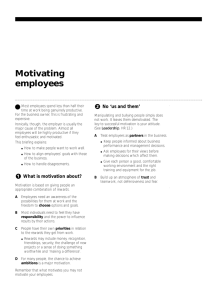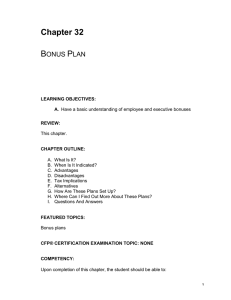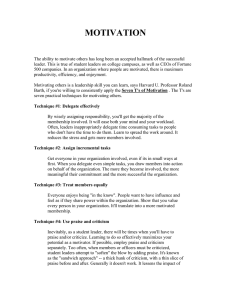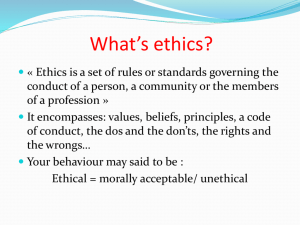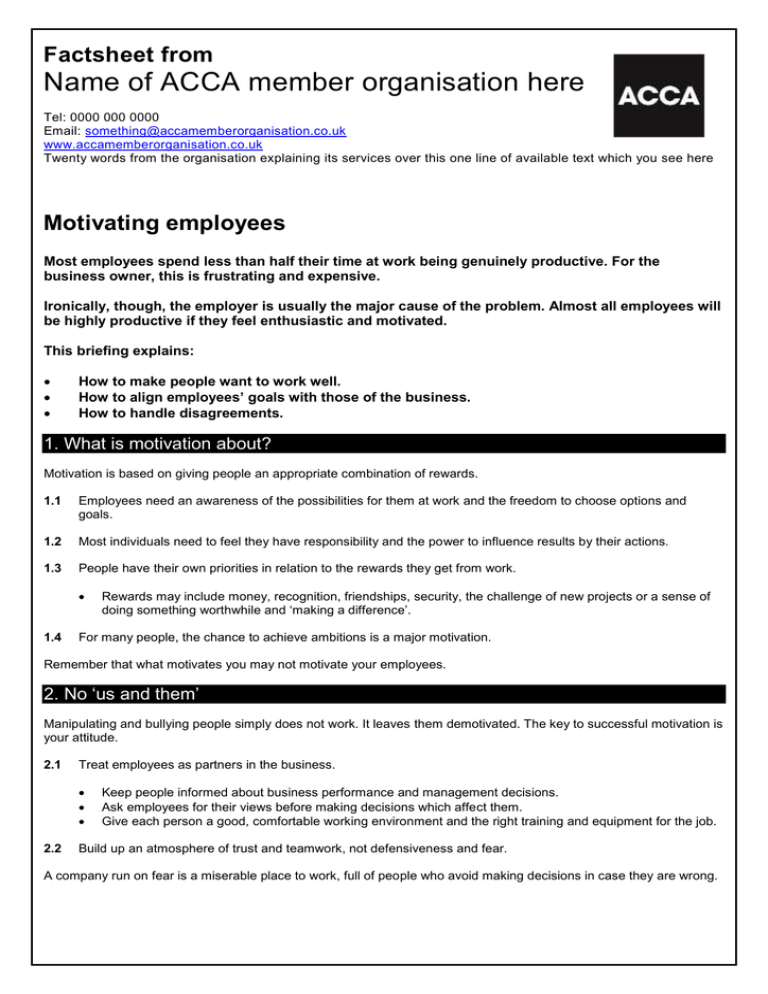
Factsheet from
Name of ACCA member organisation here
Tel: 0000 000 0000
Email: something@accamemberorganisation.co.uk
www.accamemberorganisation.co.uk
Twenty words from the organisation explaining its services over this one line of available text which you see here
Motivating employees
Most employees spend less than half their time at work being genuinely productive. For the
business owner, this is frustrating and expensive.
Ironically, though, the employer is usually the major cause of the problem. Almost all employees will
be highly productive if they feel enthusiastic and motivated.
This briefing explains:
How to make people want to work well.
How to align employees’ goals with those of the business.
How to handle disagreements.
1. What is motivation about?
Motivation is based on giving people an appropriate combination of rewards.
1.1
Employees need an awareness of the possibilities for them at work and the freedom to choose options and
goals.
1.2
Most individuals need to feel they have responsibility and the power to influence results by their actions.
1.3
People have their own priorities in relation to the rewards they get from work.
1.4
Rewards may include money, recognition, friendships, security, the challenge of new projects or a sense of
doing something worthwhile and ‘making a difference’.
For many people, the chance to achieve ambitions is a major motivation.
Remember that what motivates you may not motivate your employees.
2. No ‘us and them’
Manipulating and bullying people simply does not work. It leaves them demotivated. The key to successful motivation is
your attitude.
2.1
Treat employees as partners in the business.
2.2
Keep people informed about business performance and management decisions.
Ask employees for their views before making decisions which affect them.
Give each person a good, comfortable working environment and the right training and equipment for the job.
Build up an atmosphere of trust and teamwork, not defensiveness and fear.
A company run on fear is a miserable place to work, full of people who avoid making decisions in case they are wrong.
2.3
Keep communication open and honest.
2.4
Avoid blame — and acknowledge that mistakes are an inevitable part of the learning process.
Encourage people to ask for help when difficulties arise.
Schedule regular appraisals for employees, to review progress, problems and plans.
Encourage employees to do most of the talking during these sessions, by using open questions like: ‘How
well do you feel you are doing?’
Take an interest in people’s lives.
Be prepared to chat about the things your employees are interested in. Listen actively to whatever people
have to say.
2.5
Be consistent and fair in your approach.
2.6
Build team spirit with regular briefings.
Hold brief daily or weekly meetings to plan work, establish goals and discuss any special events and
deadlines.
Hold daily or weekly debriefings. Share any news and problems and give employees credit for their
achievements.
3. Agree goals
People will not be motivated if they do not know what is expected of them.
The objectives you identify for the company need to be turned into practical, achievable goals for the individuals
working in it. If employees can see how their success contributes to the big picture, they will feel motivated and enjoy
being part of the team.
3.1
Always agree realistic goals that directly benefit the business.
3.2
Ensure employees can influence the results they are being asked to achieve.
Agree targets against which both you and the employees can monitor performance.
Reward employees for achieving their goals — with money, praise or opportunities to run new projects.
Give everyone a chance at success.
If employees understand problems, they often come up with solutions themselves.
4. Praise and criticism
Let your employees know when they are doing well, and when they are doing badly.
4.1
Remember why you are giving feedback.
The objectives are to improve performance, help learning and build employees’ motivation and self-esteem.
Any feedback that does not contribute to these goals is counterproductive.
4.2
Respond to people’s successes and failures as soon as possible, so they can progress by making many minor
adjustments.
Be specific. Say exactly what you are congratulating people on or wanting to help them improve.
Show real feelings. Be delighted or disappointed. Make it clear that business is not just numbers to you.
Allow time to praise people properly.
Do not save up praise or criticism for reviews, or for when you lose your temper.
2
4.3
Avoid getting personal.
Describe the negative consequences of an action, rather than criticising the person.
Keep your messages of praise and criticism entirely separate.
Do not end a conversation with a criticism.
Once the message has sunk in, encourage the employee to think through with you how better results could be
achieved.
4.4
Most employers find it all too easy to complain about employees’ mistakes.
Frame criticisms constructively, in ways that will help people make improvements.
Aim to praise people’s achievements ten times as often as you point out errors.
5. Handling disagreements
You can never win an argument with an employee. The loser will become demotivated, and that is not in your interests
as an employer.
5.1
If disagreements arise, limit the damage.
5.2
Listen while employees talk.
5.3
They may have spent a long time thinking about the matters under discussion — and they may have
excellent ideas.
Acknowledge employees’ opinions, even if they are at odds with your own.
5.4
Separate facts from opinions.
Emphasise the areas where you agree.
Try putting yourself in their shoes.
Give people room to save face, especially after criticism, failure or disappointment.
Riding roughshod over employees leads to poor morale, low productivity and staff turnover.
6. Building up new skills
You can help people progress from being beginners in a role to the point where they enjoy real competence and take
full responsibility.
The process involves several stages.
6.1
When people do not know where to start, they need clear, confident instruction.
6.2
Once the basics are in place, coaching helps the employee build up skills and develop a feel for the job.
6.3
New employees, in particular, will need to be told what to do, and how to do it.
This also applies when existing employees are asked to take on new tasks.
Teach the more advanced skills as soon as the individual is ready to learn them.
As the employee becomes more involved in the task, the manager’s role is to support, rather than give
information.
Continued encouragement helps build the confidence of even experienced people.
Stop offering advice at this stage.
3
6.4
Once full competence is achieved, the trust placed in the employee by management is a major motivational
force.
6.5
Skilled employees may enjoy accepting devolved responsibilities, but you must still be there if problems need
to be discussed.
Give generous recognition for good work.
Review your own skills.
You may need to develop your ability to coach and motivate people.
7. Pay as a demotivator
Pay can also be an effective way of undermining motivation in your business.
Be aware that every pay packet sends a message — and employees are sensitive to its nuances.
7.1
If you pay less than the competition, you can expect to have demotivated employees.
7.2
If you give rises only when people threaten to quit, you are rewarding disloyalty.
7.3
If you pay higher rates to attract new employees, current employees will resent it.
7.4
If you use year-end profit as a target for bonuses, employees will not see a direct link between their efforts
and their bonuses.
The delay is too long, people know the profit figure may be altered for tax reasons and only a few employees
will believe their efforts can influence the result.
8. Make the work interesting
8.1
You need to know which employees are ambitious and which are likely to be content to stay in the same jobs.
8.2
Take any opportunities that arise to make people’s jobs more satisfying.
8.3
Identify which employees have the capacity to learn new skills.
Increasing the variety of tasks employees undertake makes work more stimulating.
Giving employees the chance to shoulder more responsibility increases their sense of involvement.
Swapping people around so they try each other’s jobs and appreciate each other’s roles develops versatility
and team spirit.
You risk losing talented employees if they are under-used, frustrated or bored.
Ask them what you could do to make their jobs more rewarding.
Ask employees the key question: ‘If you could improve just one thing about your work situation, what would it
be?’
9. When times are difficult
Any kind of change can be stressful for employees. Negative situations, like redundancies, are particularly tricky.
9.1
To keep morale in good shape, pay attention to how you communicate with employees.
Tell people what is happening, and back up what you say with factual evidence.
Offer support — be understanding if people are upset.
Give encouragement — accentuate the positive.
4
9.2
Explain why change is occurring.
Motivational carrots
Remuneration packages play an important role in motivating employees. But every employee is different and what
motivates one employee may be of little or no interest to another. To tackle this, some companies offer a ‘salad bar’
approach to remuneration that allows staff to pick and choose their benefits package.
A.
The most visible or obvious part of any remuneration package is the salary.
Salary can be made up of several elements including basic pay, commission, bonuses, profit-related pay and
share dividends.
But remember that many of the most motivated people are also the worst paid (eg nurses and teachers).
B.
Many employees appreciate company contributions to pension, insurance or healthcare schemes.
It is often much cheaper for companies to offer access to group schemes like pensions than it would be for
employees to purchase individual rights.
C.
Company cars remain a popular perk for many employees despite increasing taxation on cars and fuel.
D.
Consider offering staff discounts on your products or services.
E.
Subsidised meals and accommodation can be attractive benefits to many staff.
F.
Rewarding staff through company events and days out can be very effective.
It is a particularly useful way of rewarding groups of people and helps build team spirit at the same time.
For many employees, money and benefits are not the main motivator. Doing something worthwhile or working for
a worthwhile cause is all the motivation they need.
Bonus schemes
Bonus schemes can play an important part in fine-tuning employees’ motivation.
A.
Bonuses linked to clear targets for individual performance will encourage individual effort, but not teamwork.
B.
Bonuses linked to company profits can promote teamwork, as long as individuals can see how they can affect
the figures.
C.
Team goals could include sales, margins, costs and employee punctuality.
Bonus targets should be set monthly, so results can be monitored immediately.
D.
Each person should only have one or two immediate targets to aim for.
You can target a key area for one month only, to focus on something which would otherwise be neglected.
Bonuses based on short-term goals may actually damage long-term profit.
For example, a salesman on commission may neglect after-sales service and harm the company’s
reputation.
5
E.
Bonuses should be on top of basic pay.
F.
Reducing pay in order to fund a bonus scheme will do more harm than good.
Bonuses need not be large to be effective.
Experts’ quotes
“Everyone makes mistakes, but few people go to work with the intention of failing. Misplaced or unjust criticism is
hugely demotivating, so you must get your facts right.”
Peter Neall,
Neall Scott Partnership training consultants
“These days, ‘telling’ people what to do should be minimised. Focus mainly on your coaching skills to help them
achieve more.”
Frank Thaxton,
Thames Valley Partners business advisers
“One thoughtless act can undermine years of effort to build trust and confidence. If you find yourself getting frustrated
with people, recognise it as a symptom of your own stress and find someone who can help you understand what is
going on.”
Graham Wilson,
Leadership and Organisation Development specialist
Expert contributors
Thanks to Frank Thaxton (Thames Valley Partners business advisers, 020 7637 1727); Graham Wilson (Leadership
and Organisation Development specialist, 07785 222380; www.grahamwilson.org).
Last updated 01.02.12
© BHP Information Solutions 2012. ISSN 1369-1996. All rights reserved. No part of this publication may be reproduced or transmitted without the
written permission of the publisher. This publication is for general guidance only. The publisher, expert contributors and distributor disclaim all liability
for any errors or omissions. Consult your local business support organisation or your professional adviser for help and advice.
6

